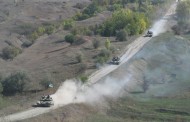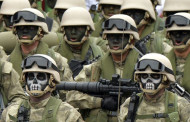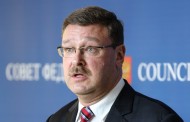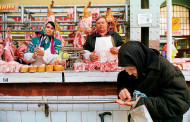In an earlier article we related our first impressions in the martyred town of Donetsk.
When we got down from the parapet of the ruined bridge leading directly to the airport, I was surprised to learn from the filming staff traveling with me that people still were living in the buildings that were damaged by mortar explosions.
The team had perhaps not expected that we would continue our inquiries, but Vyacheslav, Kristina and Svetlana were game to carry on. I wanted to to talk to these people, learn their impressions, hear their eye-witness accounts. And I was not disappointed. We had hardly just got back to the car when a babushka of more than venerable age showed up ahead.
Amidst the ruins, her appearance seemed Daliesque. I was startled when she told us she was in favor of a united Ukraine, was against Novorossiya and looked for information only from Ukrainian sources. My jaw dropped, and for several reasons. The people of Donbass gave me a new proof of the tolerance and democracy they are capable of. It was with some emotion that I realized that this woman, whose husband was soon by her side, could express an emotion so at odds with the immense majority of the Donbass public right in front of a television crew.
I couldn’t but think of the opponents of the Kiev regime that have been relentlessly persecuted, harassed, kidnapped, murdered. There are countless examples, the most terrible of which being the massacre of May 2 2014 in Odessa. But Odessa was not the only site of political and ethnic persecution: Those who did not support the brown revolution of Maidan have been persecuted throughout Ukraine, in Mariupol, Dniepropetrovsk, Kharkov, Zaporozhe, and elsewhere.
I met no others afterwards expressing the like opinions, but I could ponder on this: despite the hatred, despite the war, despite the blockade, the suffering, the hunger, the people around this aged couple respected their age, their physical integrity, and their convictions. Such an exemplary instance giving rise ultimately to hope, the hope of peace!
Right in front of the building where this couple lived, we noticed the presence of a middle aged woman at her balcony. The setting here was, if anything, even more incongruous. Lots of rubble lay here and there; some of the balconies had collapsed from explosions — much of the building had suffered from the bombardment. With her on the third or fourth floor, we started a lively conversation. This woman was an invalid and hadn’t left her apartment because she couldn’t, and did not particularly want to. Very simply, and with a smile, she declared belief in the victory of Novorossiya, that she wasn’t afraid, and that in all circumstances God would protect her.
At the time, I had no idea of the unbelievable suffering she had lived through in a spot totally ravaged since the first Ukrainians assaults.
I didn’t have to wait long to find out, as they told us that a little further on there lived another aged babushka. We were surprised to find her amidst social worker volunteers. These citizens of the town scour the neighborhoods to support people who are isolated, providing them with food, moral support, their company, and, today, even flowers! Wonderful example of the solidarity that we are already almost incapable of, ourselves. Just think of the appalling carnage of the heatwave of 2003…
Margarita, aged 79, opened her apartment door wide for us with vivacity and a surprising freshness.
We had barely got in when we found the hallway blocked by bedding. With dignity, the old woman explained that she slept there. It was the safest place in her ground floor apartment. She has slept on a mattress placed right on the floor these past six months.
Her story was particularly moving. She was happy to see us and in perfect Russian she explained that she was a professor of Physics and Mathematics, born right here in the Donbass. In Soviet times, she taught in Yakutia, and then returned to her native soil. Her voice, clear and clean, was firm and decisive. With strong words she told us how she had lived here alone during the battle right up to this day. To our question why didn’t she leave, she answered “But to go where? My husband is dead, I am a widow, my children are dead. I’m home here. This is my apartment.” I felt a strength in this woman.
She went on to tell us about the fighting, the projectiles hitting out front of her building by the hundreds, every day that went by. About the fear that came when all the windows were blasted out, about the first bombardments, all the inhabitants recoiling in corners of their apartments, or on the ground floor, or in basements. And then about the glacial cold for weeks on end at – 20 C, without windows, swaddled and bedded down in the dark hallway.
Soon all the inhabitants had fled, leaving only Margarita and the invalid woman.
In death’s antechamber they lived, cooking outdoors over a fire, a bit of porridge, “because it’s all we’ve got, and simple and quick to make.” Every day the same ritual, go look for water nearby, for cooking and to splash on one’s face. It was life without running water, without electricity, without heat. Margarita explained the violence of the fighting: the walls shake, the curtains furl from the powerful blasts of explosions, some days for hours on end.
Despite the sombre and distressful time I could see that this old woman had kept the energy necessary to carry on. She spoke to us without hatred, emphasis, or sadness. A firm resolution possessed her, the proof that she was unbroken. Yet she said “It’s hard to believe that I have survived” and given her surroundings, we could only agree. Her recounting was inexhaustible, we all smiled before her — she seemed at that moment so moving. It was the soul of a people that spoke.
When at last the time came to leave, Vyacheslav about had his arm in a sling: he’d been holding a heavy camera the whole while. As we were leaving the elderly woman, she wanted a picture of us together. I obliged with great joy — by this time she could have been my own grandmother, and I would have been proud of it if she were. Even though it is no part of the Slavic culture, I asked to kiss her on both cheeks, as in France. Our tearing eyes were full of emotions.
We leave this infernal spot and walk to our car. Vyacheslav keeps filming. We get in. Kristina wants to know my impressions; when I don’t understand, Svetlana pitches in. In the car, in front of camera and microphone, emotions just got too stong. They got to me like so many daggers. I think of all the shameful propaganda of the French media, of the betrayal of the ideals of the Republic and the Enlightenment. We are culpable, in France, for what I have just seen. Kristina’s questions make me lose it.
A heavy silence came over the inside of the car. What can I tell them? That France has participated in buying munitions and materiel by the billions, given to Poroshenko through the European Union? What can I say about the infamy, the shame, not of being French, but of our politics, of Official France? SHE is responsible for the massacre, she has done nothing, or practically nothing, but to deny these people, to deny the Donbass, and instead say nothing but Russia! Putin! But during my whole trip I didn’t see one Russian soldier, and at no time or rarely did I get wind of any mention of Putin among the insurgents.
Then I weep, my lightened path goes dark, I don’t know if my companions have understood, if they’re going to understand, I weep from rage, and from shame. Have I myself done enough for them?
Laurent Brayard
Translated from French by Tom Winter







Recent Comments
tiredofthemedialies in: British veterans to arrive in Sevastopol despite UK Foreign Office’s warning
I agree. Brave and heroic `veterans who were prepared to give all alon ...
Andrew in: British veterans to arrive in Sevastopol despite UK Foreign Office’s warning
Such honour. This was a pleasure to read ...
honorin in: La nouvelle Allemagne a 25 ans et il est de retour !
70 ans après ils ont fini par la gagner cette fichue guerre ...
Snap in: (PHOTOS, VIDEO) Manifestation de soutien au président Poutine le 2 octobre 2015 à Paris
13 avec moi en plus ! ...
Equipe rédactionnelle in: Vladislav Breeg : la tristesse parisienne de Porochenko
Dans le texte: imaginez... Bon, vous avez raison, il faut un subjoncti ...